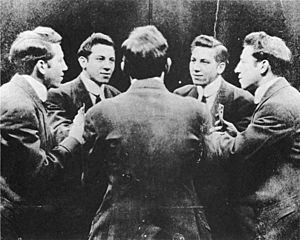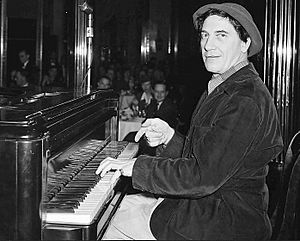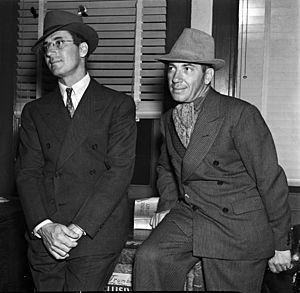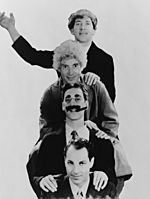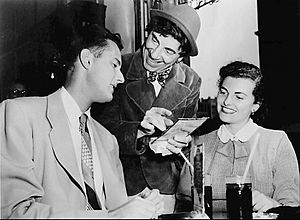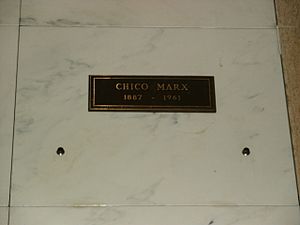Chico Marx facts for kids
Quick facts for kids
Chico Marx
|
|
|---|---|
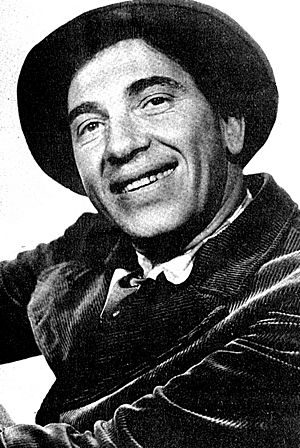
Chico, c. 1930. at 43
|
|
| Born |
Leonard Joseph Marx
March 22, 1887 |
| Died | October 11, 1961 (aged 74) Hollywood, California, U.S.
|
| Burial place | Forest Lawn Memorial Park Cemetery, Glendale, California, U.S. |
| Other names | Leo Marx |
| Occupation |
|
| Years active | 1910–1960 |
| Height | 5 ft 6 in (168 cm) |
| Spouse(s) |
|
| Children | 1 |
| Parent(s) | Sam "Frenchie" Marx Minnie Schönberg |
| Relatives | Harpo Marx (brother) Groucho Marx (brother) Gummo Marx (brother) Zeppo Marx (brother) Al Shean (maternal uncle) |
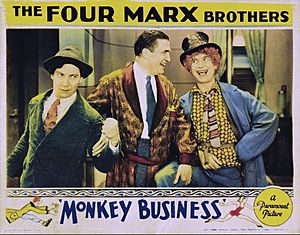
Leonard Joseph "Chico" Marx (pronounced "Chick-oh"; March 22, 1887 – October 11, 1961) was a famous American comedian, actor, and pianist. He was the oldest brother in the hilarious Marx Brothers comedy group. His brothers were Adolph ("Harpo"), Julius ("Groucho"), Milton ("Gummo"), and Herbert ("Zeppo").
Chico's character on stage and in movies was a charming, clever person who seemed to be from Italy. He often wore old clothes, a curly wig, and a special hat. In their films, Chico often teamed up with Harpo. They would often try to trick or outsmart Groucho. Leonard was the oldest Marx brother to live past infancy. He also helped manage the group in their early days.
Contents
Early Life of Chico Marx
Chico Marx was born in Manhattan, New York City, on March 22, 1887. His parents were Sam Marx, also known as "Frenchie," and Minnie Schoenberg Marx. Minnie's brother was the well-known comedian Al Shean. The Marx family was of Franco-German Jewish background. His father was a tailor from Alsace, and his mother was from East Frisia in Germany.
Chico's Stage Character
Chico's stage name was "Chico," pronounced "Chick-oh." He played a character who seemed to be Italian. This kind of character was common in vaudeville shows back then.
Sometimes, his characters seemed genuinely Italian. For example, in the film The Big Store, his character Ravelli meets an old friend he worked with in Naples. In Monkey Business, Chico even claimed his grandfather sailed with Christopher Columbus.
Chico's character often seemed a bit confused. He would misunderstand words spoken by other characters, especially Groucho. However, he was often very clever. He would find ways to get money from others, sometimes by tricking them. Groucho was usually his main target.
Chico was a very talented pianist. He learned to play mostly by himself. When he was young, he played piano to earn money for his family. Sometimes he even worked two jobs at once. He would get one job, work a few nights, and then have Harpo take over for him. Chico and Harpo looked so much alike when they were boys that people often mixed them up.
In the Marx Brothers' last movie, Love Happy, Chico plays a piano and violin duet with another character. Chico joked, "Look-a, Mister Lyons, I know you wanna make a good impression, but please don't-a play better than me!"
Groucho Marx once said that Chico never practiced his piano pieces. Instead, he would soak his fingers in hot water before shows. He was known for his unique way of playing the piano, sometimes "shooting" the keys. He would play notes with his thumb up and index finger straight, like a gun. In Go West, he even played the piano by rolling an orange over the keys!
After their mother, Minnie Marx, passed away in 1929, Chico became the unofficial manager of the Marx Brothers. He helped them get a special deal with movie studios. They were the first in Hollywood to get a percentage of a film's earnings. This is a common practice today. Chico also helped the brothers get a new contract with Metro-Goldwyn-Mayer when their career was slowing down.
In the 1930s and 1940s, Chico led a big band. The famous singer Mel Tormé started his career singing with the Chico Marx Orchestra. In the 1950s, Chico appeared on TV shows and commercials. His last appearance with Harpo and Groucho was in 1959 on General Electric Theater.
How Chico Got His Name
Chico got his nickname during a card game in Chicago in 1915. It was first spelled Chicko. But a typesetter accidentally left out the 'k', so it became Chico. The Marx brothers always said it "Chick-oh." Even though others sometimes said it "Cheek-oh," Chico never corrected them.
Chico's Financial Habits
Chico often had money troubles throughout his life. This meant he kept working in show business even after his brothers had retired. In the early 1940s, he was performing in small venues, just like when he started his career.
The Marx Brothers' movie, A Night in Casablanca (1946), was made partly to help Chico with his finances. Because of his money challenges, his brothers eventually helped him manage his earnings. They put him on an allowance, which he received until he passed away.
Chico was known as a very good pinochle player. He and Harpo learned this card game from their father. Groucho said Chico would sometimes throw away good cards just to make the game more exciting. Chico's last public appearance was in 1960. He played cards on a TV show called Championship Bridge.
Family Life
Chico was married two times. His first marriage was to Betty Karp in 1917. They had one daughter named Maxine (1918–2009). Chico was very close to Maxine and even gave her acting lessons.
Chico's second marriage was to Mary De Vithas. They got married in 1958, three years before he died.
Awards and Special Recognition
In 1974, at the 46th Academy Awards, Jack Lemmon gave Groucho Marx an honorary Academy Award. This award was also meant for Harpo, Chico, and Zeppo. Groucho said, "I wish that Harpo and Chico could be here to share with me this great honor." He was talking about his two brothers who had already passed away.
Illness and Death
Chico passed away on October 11, 1961, at his home in Hollywood. He was 74 years old. He was the oldest of the Marx brothers and the first one to die. His second wife, Mary, and his daughter, Maxine, survived him.
Chico is buried in the mausoleum at Forest Lawn Memorial Park Cemetery in Glendale, California. His brother Gummo is buried in a crypt across the hall from him.
Film Appearances
- Films
- The Cocoanuts (1929) as Chico
- Animal Crackers (1930) as Signor Emanuel Ravelli
- The House That Shadows Built (1931) as Tomalio
- Monkey Business (1931) as Chico
- Horse Feathers (1932) as Baravelli
- Duck Soup (1933) as Chicolini
- A Night at the Opera (1935) as Fiorello
- A Day at the Races (1937) as Tony
- Room Service (1938) as Harry Binelli
- At The Circus (1939) as Antonio "Tony" Pirelli
- Go West (1940) as Joe Panello
- The Big Store (1941) as Ravelli
- A Night in Casablanca (1946) as Corbaccio
- Love Happy (1949) as Faustino the Great
- The Story of Mankind as Monk (uncredited)
Broadway Shows
- I'll Say She Is
- The Cocoanuts
- Animal Crackers
See also
 In Spanish: Chico Marx para niños
In Spanish: Chico Marx para niños
 | William Lucy |
 | Charles Hayes |
 | Cleveland Robinson |


